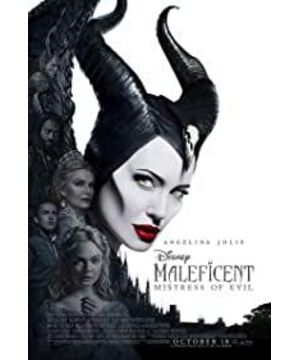The second part is still unable to escape the word "love". Although Aurora did not meet a scumbag, she was similarly lost in love with Philip, and she didn't wake up until a coincidence and the accumulation of damage. First of all, the second part affects me more than the first one is the expectation of love. Two of the peaks are between Aurora and Maleficent.
At the beginning of the film, I seem to take the role of Aurora and hope that pure love can move Maleficent, who is hurt by love. But not at first, and in the end, because of his love for Aurora, Maleficent made a clumsy attempt. As soon as I tried it, something went wrong.
After the trouble, Maleficent was injured and returned to the Night Race. After rectifying it, he launched an attack. As a result, on the wedding day, both the Night Race and the Elves were bruised by the Queen's defense. When Maleficent blocked the arrow for Aurora because of love, and the regretful Aurora shed tears for the disappearing Maleficent, all my expectations for love were once again occupied by regret. What exactly can a missed love bring? Fortunately, Disney certainly won't stop the plot at such a tragic moment. The final scene of phenix rising is pretty good. So, at least in fairy tale movies, we can still look forward to love~
But what about in reality? I skimmed through some of the reviews and was very disappointed. Maybe I am not a "senior movie fan", so I may not follow the general "film aesthetic rules". Maybe under popular standards, the "love" in it doesn't meet the audience's expectations. However, the love in it hits my point.
Maleficent's Self-Sacrificing Love : The phoenix's nirvana moment reminds me of "He who lost his life for my sake will find it." There must be self-denial in true love. I can't understand what some film critics said about Maleficent as a "maternal love output machine", and even said that it caused children to misunderstand selfless maternal love. With a sigh, I can only say that if a child sees Maleficent's expression of motherly love and asks why his mother can't love him so selflessly, it can only be said that the child's family education went wrong early in the morning, not the movie itself. problem. The highlight of Maleficent's love lies in the "self-denial" of love. "Self-denial" is the opposite of "selfishness." True self-denial, which is complete in itself, does not require a reward/feedback to be a legitimate oneness. Moreover, in my opinion, using art to promote to children how great mother's love is is only "part of" the routine of art. The receiver of "promotion" is the brain, and the supply station of "love" is the heart. Since people's hearts can no longer be moved by "self-denial", how can they strive to "deny themselves" in their own love?
Aurora's Immature Love : Aurora used to naively said "I love you" to Maleficent many times, but her love was untested, immature love. So much so that there is a lack of basic trust in this love. Many people criticized the heroine for being stupid and Bai Tian, and the cabbage was beaten by the pigs and even helped the pig family to hurt their godmother... All I can say is that everyone understands when they watch the movie. But understand that people haven't learned a lesson they should learn from the "fairy tale princess" created by the movie? One of the lessons I've learned is that when people don't understand what love is, all claims of love are weak, pale, and even meaningless. When love just stays in the mind, in the mouth, and only floats in the interaction of good times, this kind of love is still very far from true love. Aurora's last tears for Maleficent are a sign of love after it has been tempered, and it also declares that this love has entered the heart from the brain. Looking closely, the love that Aurora talked about in the past was out of the girl's innocence and the company of Maleficent, but she never experienced "self-denial" in this love. Until Maleficent suppressed his past pains for her, and forced a smile to see his in-laws, this may be the earliest time Aurora has left "self-sacrifice" in the film. But she was unresponsive, unthankful, immersed in the gratification of her own pleasure. This is a stronger contrast between "selfishness" and "self-denial/selflessness". It can be seen that when the heart is blinded by selfish desires, how much beauty is not seen and appreciated. It wasn't until this "self-denial" endangered his life that Aurora finally understood. But will reality pay for the dullness and rigidity of the human heart like a fairy tale?
So, what do people expect in love? The first is to love and be loved. If people expect to be "loved" and "satisfied" in love, then such love is childish and unreal fairy tales. Second, what do people give in love? Are there any reservations when it comes to "shelf"? Maybe the truth is that only unreserved equanimity can get more precious than what you once valued?
I feel that some of the important human elements in the film are not within the comprehension of mainstream voices. In other words, under the aesthetic principles of mainstream voices, those who are "wise" are regarded as "foolish".
Film criticism is just a record, and then a voice. There are many supporters and many opponents, what is the real difference? The most real difference lies in what each person feels, thinks about, and internalizes from the work. Whether the plot is good or the IMAX effect is good, it is better to satisfy the desires of the five senses and the mind for stimulation and conflict. If not, it is acceptable, as long as the film truly conveys something that can enter the heart.
I don't know how the third part will continue to think and show about love, look forward to it!
View more about Maleficent: Mistress of Evil reviews











